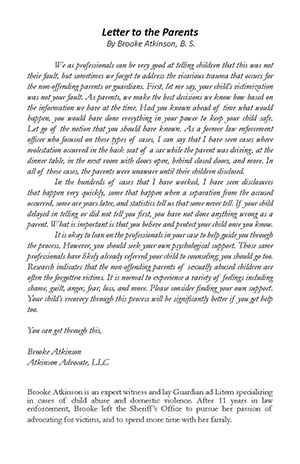 We as professionals can be very good at telling children that this was not their fault, but sometimes we forget to address the vicarious trauma that occurs for the non-offending parents or guardians.
We as professionals can be very good at telling children that this was not their fault, but sometimes we forget to address the vicarious trauma that occurs for the non-offending parents or guardians.
First, let me say, your child’s victimization was not your fault.
As parents, we make the best decisions we know how based on the information we have at the time. Had you known ahead of time what would happen, you would have done everything in your power to keep your child safe. Let go of the notion that you should have known.
As a former law enforcement officer who focused on these types of cases, I can say that I have seen cases where molestation occurred in the back seat of a car while the parent was driving, at the dinner table, in the next room with doors open, behind closed doors, and more. In all of these cases, the parents were unaware until their children disclosed.
In the hundreds of cases that I have worked, I have seen disclosures that happen very quickly, some that happen when a separation from the accused occurred, some are years later, and statistics tell us that some never tell.
If your child delayed in telling or did not tell you first, you have not done anything wrong as a parent. What is important is that you believe and protect your child once you know.
It is okay to lean on the professionals in your case to help guide you through the process. However, you should seek your own psychological support.
They have likely already referred your child to counseling, and you should go too. Research indicates that the non-offending parents of sexually abused children are often the forgotten victims.
It is normal to experience a variety of feelings including shame, guilt, anger, fear, loss, and more.
Please consider finding your own support. Your child’s recovery through this process will be significantly better if you get help too.
You can get through this,
Brooke Atkinson – Atkinson Advocate, LLC
Brooke Atkinson is an expert witness and lay Guardian ad Litem specializing in cases of child abuse and domestic violence. After 11 years in law enforcement, Brooke left the Sheriff’s Office to pursue her passion of advocating for victims, and to spend more time with her family.





Recent Comments